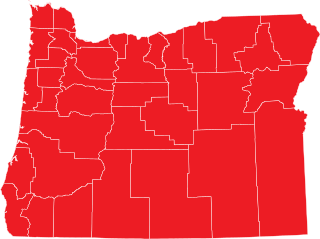Related Research Articles

Proposition 13 is an amendment of the Constitution of California enacted during 1978, by means of the initiative process. The initiative was approved by California voters on June 6, 1978. It was upheld as constitutional by the United States Supreme Court in the case of Nordlinger v. Hahn, 505 U.S. 1 (1992). Proposition 13 is embodied in Article XIII A of the Constitution of the State of California.
Ballot Measure 47 was an initiative in the U.S. state of Oregon that passed in 1996, affecting the assessment of property taxes and instituting a double majority provision for tax legislation. Measure 50 was a revised version of the law, which also passed, after being referred to the voters by the 1997 state legislature.
The Oregon tax revolt is a political movement in Oregon which advocates for lower taxes. This movement is part of a larger anti-tax movement in the western United States which began with the enactment of Proposition 13 in California. The tax revolt, carried out in large part by a series of citizens' initiatives and referendums, has reshaped the debate about taxes and public services in Oregon.

Bill Sizemore is an American political activist and writer in Happy Valley, Oregon, United States. Sizemore has never held elected office, but has nonetheless been a major political figure in Oregon since the 1990s. He is considered one of the main proponents of the Oregon tax revolt, a movement that seeks to reduce taxes in the state. Oregon Taxpayers United, a political action committee he founded in 1993, has advanced numerous ballot initiatives limiting taxation, and has opposed spending initiatives. Sizemore made an unsuccessful run for Governor of Oregon in 1998. He also announced his intention to run for governor in 2010, but was indicted by the state on charges of tax evasion. The charges were later amended to failure to file tax returns.

Oregon ballot measure 48 was one of two unsuccessful ballot measures sponsored by the Taxpayers Association of Oregon (TAO) on the November 7, 2006 general election ballot. Measure 48 was an initiated constitutional amendment ballot measure. Oregon statute currently limits state appropriations to 8% of projected personal income in Oregon. If Governor declares emergency, legislature may exceed current statutory appropriations limit by 60% vote of each house. This measure would have added a constitutional provision limiting any increase in state spending from one biennium to next biennium to the percentage increase in state population, plus inflation, over previous two years. Certain exceptions to limit, including spending of: federal, donated funds; proceeds from selling certain bonds, real property; money to fund emergency funds; money to fund tax, "kicker," other refunds were included in the provisions of the measure. It also would have provided that spending limit may be exceeded by amount approved by two-thirds of each house of legislature and approved by majority of voters voting in general election.

The State Income Tax Repeal, also known as Massachusetts Question 1, was one of the 2008 ballot measures that appeared on the November 4, 2008 ballot in the U.S. state of Massachusetts. Voters were asked whether or not they approved of the proposed measure which, if it had passed, would have ended the 5.3% income tax in Massachusetts on wages, interest, dividends and capital gains. Ultimately, Massachusetts voters defeated Question 1 by a wide margin, with approximately 70% opposed versus 30% in favor.

The 75th Oregon Legislative Assembly convened beginning on January 12, 2009, for its biennial regular session. All of the 60 seats in the House of Representatives and half of the 30 seats in the State Senate were up for election in 2008; the general election for those seats took place on November 4.

Initiative 126 or the Savings Account for Education Initiative appeared on the ballot as Amendment 59. The measure would have created a savings account in the state education fund funded by 10 percent of the monies deposited into the fund, including revenue that would otherwise be rebated under the Taxpayer Bill of Rights rules.

Oregon Ballot Measure 59 was an initiated state statute ballot measure sponsored by Bill Sizemore that appeared on the November 4, 2008 general election ballot in Oregon, United States. If it had passed, Oregon would have join Alabama, Iowa, and Louisiana as the only states to allow federal income taxes to be fully deducted on state income tax returns.

Oregon ballot measure 41 was one of two unsuccessful ballot measures sponsored by the Taxpayers Association of Oregon (TAO) on the November 7, 2006 general election ballot. If passed it would have allowed a state income tax deduction equal to Federal exemptions deduction to substitute for state exemption credit on a persons state income tax filing.

Oregon Ballot Measure 56 or House Joint Resolution 15 is a legislatively referred constitutional amendment that enacted law which provides that property tax elections decided at May and November elections will be decided by a majority of voters who are voting in the relevant election. It repealed the double majority requirement passed by the voters in the 1990s via Measures 47 and 50, which requires that, for non-general elections, all bond measures can pass only when a majority of registered voters turn out.

Ballot Measure 50 was a legislatively referred state statute ballot measure for the November 6, 2007 special election ballot in the state of Oregon. This measure would have increased the tobacco tax and dedicated the new revenue to providing health care for children, low-income adults and other medically underserved Oregonians, and to fund tobacco prevention and education programs. The proposal would have increased the tax on cigarettes by 84.5 cents per pack, and increased the tax on other tobacco products.

Measures 66 and 67 are two ballot referenda that were on the January 26, 2010 special election ballot in the US state of Oregon, which proposed tax increases on corporations and on households making US$250,000 and individuals making $125,000 to help balance the state's budget. The measures referred two bills passed by the Oregon state legislature on June 11, 2009, and signed by Governor Ted Kulongoski on July 20, 2009, to the voters for approval. They were approved and became effective February 25, 2010.

Massachusetts Question 3, filed under the name, the 3 percent Sales Tax Relief Act, appears on the November 2, 2010 ballot in the state of Massachusetts as an initiative. The measure, if enacted by voters, would reduce the state sales tax rate from 6.25 to 3 percent. The measure is being sponsored by the Alliance to Roll Back Taxes headed by Carla Howell. The measure would be enacted into a law 30 days after the election if approved by voters.

On November 6, 2012, the U.S. state of Oregon held statewide general elections for four statewide offices, both houses of the Oregon Legislative Assembly, and several state ballot measures.

Proposition 39 is a ballot initiative in the state of California that modifies the way out-of-state corporations calculate their income tax burdens. The proposition was approved by voters in the November 6 general election, with 61.1% voting in favor of it.

Oregon Ballot Measure 97 was a ballot measure in the 2016 election in the U.S. state of Oregon. The initiative asked voters to determine whether or not to impose a 2.5 percent gross receipts tax on C corporations with Oregon sales exceeding $25 million. S corporations and benefit companies would be exempt from the tax. It was estimated the measure would raise $3 billion annually for the state, if passed.

Proposition 13 was a failed California proposition on the March 3, 2020, ballot that would have authorized the issuance of $15 billion in bonds to finance capital improvements for public and charter schools statewide. The proposition would have also raised the borrowing limit for some school districts and eliminated school impact fees for multifamily housing near transit stations.

California Proposition 15 was a failed citizen-initiated proposition on the November 3, 2020, ballot. It would have provided $6.5 billion to $11.5 billion in new funding for public schools, community colleges, and local government services by creating a "split roll" system that increased taxes on large commercial properties by assessing them at market value, without changing property taxes for small business owners or residential properties for homeowners or renters. The measure failed by a small margin of about four percentage points.
References
- 1 2 "Common questions about the 2007 kicker". Oregon Department of Revenue. Archived from the original on 2008-02-06. Retrieved 2008-02-12.
- 1 2 "Measure 85: Voters repeal corporate kicker". The Oregonian. November 6, 2012. Retrieved February 15, 2013.
- 1 2 "Measure 8 - State Spending Limit" (PDF). www.leg.state.or.us. Legislative Revenue Office. 2000-09-07. Retrieved 2008-02-13.
- 1 2 "2% Surplus Refund (Kicker) History" (PDF). Oregon Department of Revenue. 2002. Retrieved 2008-02-13.
- 1 2 "The 2007 Kicker: Wrongheaded, Unjust, Costly, and a Federal Tax Increase". 2007-10-26. Retrieved 2008-02-13.
- ↑ "Oregon 2% Surplus Kicker: 2001 update" (PDF). www.leg.state.or.us. Legislative Revenue Office. Retrieved 2008-02-12.
- ↑ "The kicker could cost $1 billion". Mail Tribune. 2002-01-03. Retrieved 2008-02-12.
- 1 2 3 Edwards, Randall (January 26, 2008). "Time is up for personal kicker". Statesman-Journal.
- ↑ McCall, William (2006-06-02). "Gov. may suspend large tax refund". www.dailyvanguard.com. Daily Vanguard. Retrieved 2008-02-13.
- 1 2 "Income Tax Kickers Disproportionately Benefit Multistate Corporations and Wealthy Oregonians". www.ocpp.org. Oregon Center for Public Policy. March 28, 2006. Retrieved April 1, 2018.
